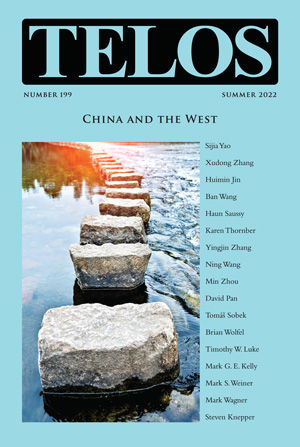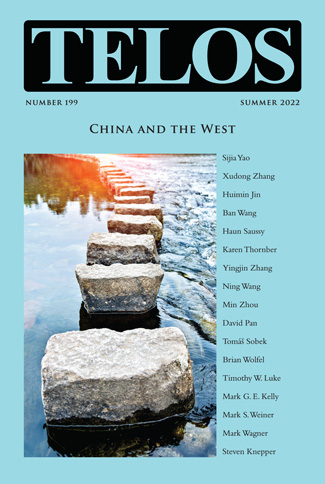In today’s episode of the Telos Press Podcast, David Pan talks with Brian Wolfel about his article “Thomas Carlyle’s Conception of Transcendentalism in Sartor Resartus and Its Application to Theorizing Postliberalism,” from Telos 199 (Summer 2022). An excerpt of the article appears here. In their conversation they discuss the problems of liberalism that transcendentalism tries to address; the basic characteristics of the transcendentalism that Thomas Carlyle describes in Sartor Resartus; how Carlyle’s transcendentalism embodies a kind of post-liberalism; how Carlyle’s transcendentalism can be understood as anti-dogmatic, or as a dogmatic anti-dogmatism; how Carlyle’s transcendentalism functions as a practical political philosophy; the relation of Carlyle’s transcendentalism to American transcendentalism and contemporary New Age philosophy; and the perilous status of liberalism in relation to current forms of authoritarianism. If your university has an online subscription to Telos, you can read the full article at the Telos Online website. For non-subscribers, learn how your university can begin a subscription to Telos at our library recommendation page. Print copies of Telos 199 are available for purchase in our online store.
|
In today’s episode of the Telos Press Podcast, David Pan talks with Tomáš Sobek about his article “Tolerance as Suppressed Disapproval,” from Telos 199 (Summer 2022). An excerpt of the article appears here. In their conversation they discuss the difference between a moral norm and tolerance as well as the consequences of this difference for understanding tolerance; tolerance as a second-order attitude that involves a suppression of disapproval; how excessive tolerance can be wrong; the difference between positive and negative liberalism; and whether negative liberalism is opposed to or destructive of moral norms. If your university has an online subscription to Telos, you can read the full article at the Telos Online website. For non-subscribers, learn how your university can begin a subscription to Telos at our library recommendation page. Print copies of Telos 199 are available for purchase in our online store. In today’s episode of the Telos Press Podcast, David Pan talks with Courtney Hodrick about her article “From Neoreaction to Alt-Right: A Schmittian Perspective,” from Telos 198 (Spring 2022). An excerpt of the article appears here. In their conversation they discuss Carl Schmitt’s understanding of the relationship between liberalism and democracy, and how the separation of the two from each other leads to two versions of extreme right thinking; the general outlines of Mencius Moldbug’s rejection of politics in favor of markets and the relationship between this approach and Schmitt’s understanding of politics as based in the friend/enemy distinction; why Moldbug is an example of what Schmitt defines as liberal; how Moldbug’s ideas contrast with those of Richard Spencer and the extent to which Spencer is a Schmittian; and Curtis Yarvin’s recent shift away from his previous rejections of nationalism and whether this shift represents a merging of neoreaction with alt-right populism. If your university has an online subscription to Telos, you can read the full article at the Telos Online website. For non-subscribers, learn how your university can begin a subscription to Telos at our library recommendation page. Print copies of Telos 198 are available for purchase in our online store. Telos 199 (Summer 2022): China and the West is now available for purchase in our store. Individual subscriptions to Telos are also available in both print and online formats.
It would be a mistake, though, to see China and the West as polar opposites or competing civilizations, separated by their opposing political interests on the one hand and by the history of each of their cultural traditions on the other hand. Even if they had separate long histories, the recent past has seen many more opportunities for interaction and orientation around common projects and problems. Moreover, since the past is always a projection from out of the present, the idea of a clash of civilizations is not a legacy but a project. An alternative endeavor would be to conceive of the relationship between China and the West as existing within a larger totality. The definition of such a totality must occur within a particular perspective, however, and therein lies the problem. China and the West are clearly competing to define the framework of global order. Consequently, any attempt to consider the relationship between the two must look to the vision of universality that each side is trying to establish against the other. This issue of Telos considers a variety of ways of defining the overarching perspective from which the comparison between China and the West makes sense. |
||||
|
Telos Press Publishing · PO Box 811 · Candor, NY 13743 · Phone: 212-228-6479 Privacy Policy · Data Protection Copyright © 2025 Telos Press Publishing · All Rights Reserved |
||||




